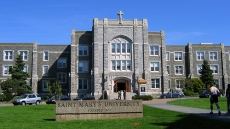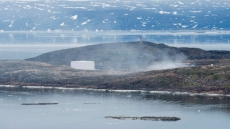OTTAWA - The move from small and isolated communities to larger urban centres can be quite jarring for aboriginals who join the Canadian Armed Forces, says a newly released document.
Being so far away from their families brought some aboriginal recruits to tears, says an internal study, while others got sick on the kinds of food served in mess halls.
The culture shock of going from reserve to recruit is one of the biggest challenges the military must contend with as it competes with other employers to hire aboriginals, one of the fastest-growing segments of Canada's workforce.
Aboriginals were surveyed about how they adjusted to urban life after they joined the military. The Canadian Press obtained a copy of the findings, published this past June, under the Access to Information Act.
Some found it overwhelming to manage their schedules and pay their bills. Others complained about the rigour of military life, or switching from diets consisting of fresh caribou and char to standard mess-hall fare.
Feeling as though they had lost touch with their culture was another concern to many of the people surveyed.
"They reported having had negative perceptions of the city, the main reasons being that they felt lost, disconnected from their culture and had more difficulty building trust and friendships with people in the city," the report says.
"They also believed that the city is a hotbed of drugs, alcohol and violence."
Aboriginals have long been under-represented within the military. They now make up only 2.3 per cent of the combined regular force and primary reserves, the report says. The target for aboriginal people in the military is 3.4 per cent.
The study, done by Defence Research and Development Canada, was meant to help the Canadian Armed Forces improve its existing programs to help aboriginal recruits from isolated communities better adapt to urban life while serving in the military.
The results of the study are based on focus groups held in Kingston, Ont., Saskatoon and Prince Albert, Sask., and Yellowknife between November 2012 and April 2013. A combined total of 35 people took part in the survey.
Participants reported feeling stereotyped after they joined the military.
"Some military members have the same perceptions — no matter where you go there is this same idea that all aboriginal people are drunks and are lazy," one of the participants said.
"The negative perception that people have about us makes it harder to get jobs or be integrated in the (Canadian Armed Forces). I always have to continually prove myself."
Others had a hard time being away from their families.
"It can be very difficult for some people to come from very isolated communities to life in the (Canadian Armed Forces) — they have no idea what to expect," one person said.
"Some of them couldn't adjust and couldn't stop crying; they weren't used to being away from their families and had no idea how hard it could be."
The military has appointed Lt.-Gen. Marquis Hainse, the commander of the army, as its "champion" for aboriginal issues, a spokeswoman said.
"Regarding the internal report produced by Defence Research and Development Canada ... (Canadian Armed Forces) leadership is consulting and analysing its recommendations," Marie-Helene Brisson wrote in an email.
Christian Leuprecht, who teaches at the Royal Military College of Canada and Queen's University in Kingston, Ont., said the problem of aboriginals being under-represented isn't exclusive to the military.
"I wouldn't chalk it up to the (Canadian Forces) not trying hard enough," he said.
"I mean, the RCMP has the same sort of problem, and generally security forces have that type of problem."





